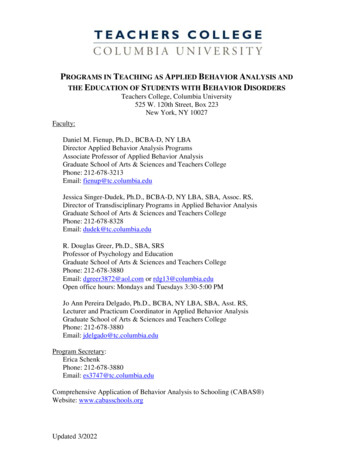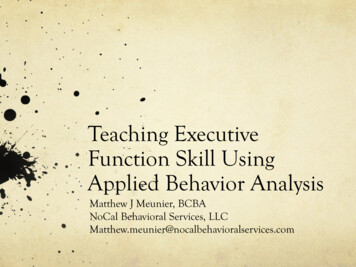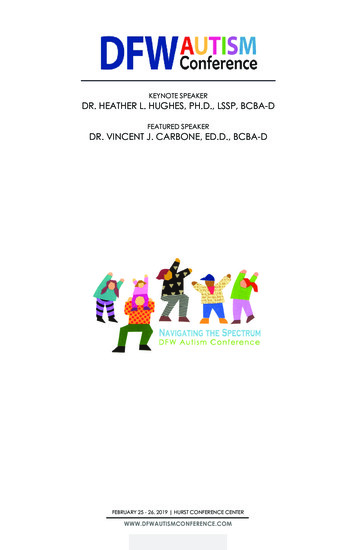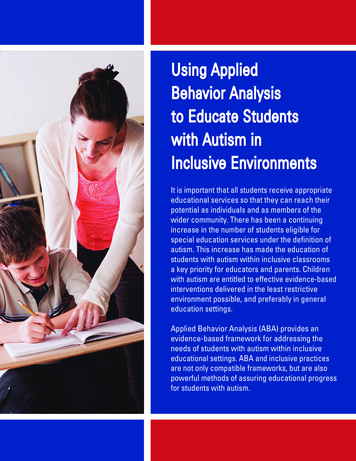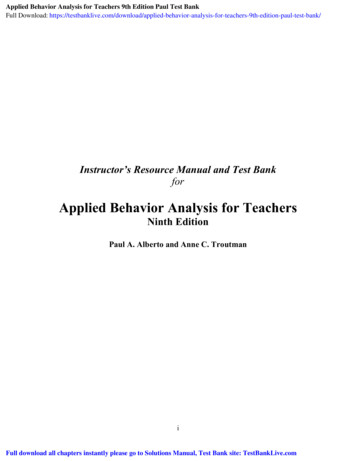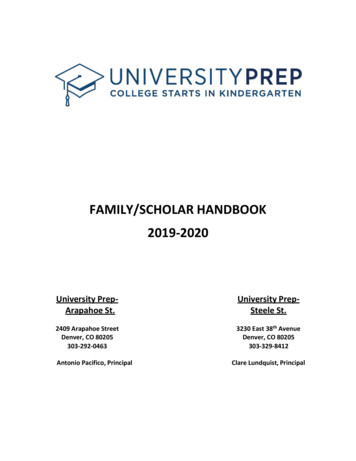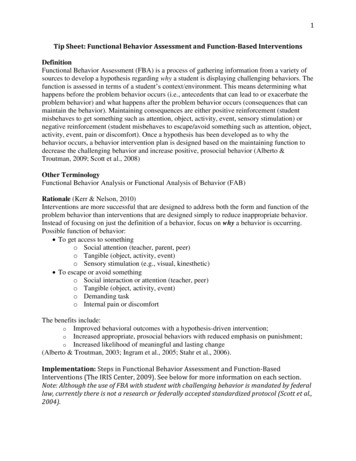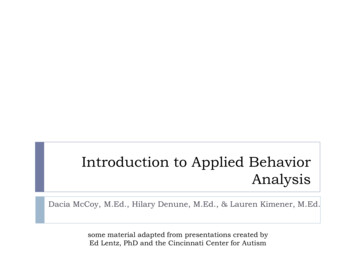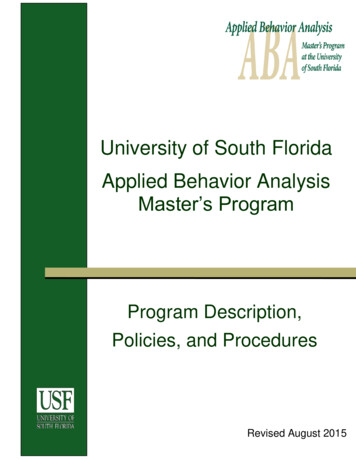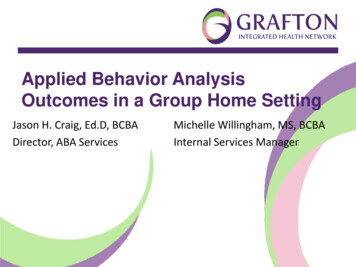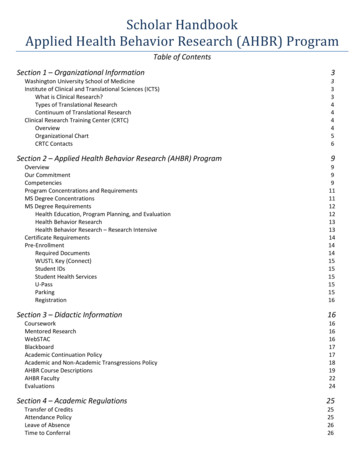
Transcription
Scholar HandbookApplied Health Behavior Research (AHBR) ProgramTable of ContentsSection 1 – Organizational Information3Section 2 – Applied Health Behavior Research (AHBR) Program9Washington University School of MedicineInstitute of Clinical and Translational Sciences (ICTS)What is Clinical Research?Types of Translational ResearchContinuum of Translational ResearchClinical Research Training Center (CRTC)OverviewOrganizational ChartCRTC ContactsOverviewOur CommitmentCompetenciesProgram Concentrations and RequirementsMS Degree ConcentrationsMS Degree RequirementsHealth Education, Program Planning, and EvaluationHealth Behavior ResearchHealth Behavior Research – Research IntensiveCertificate RequirementsPre-EnrollmentRequired DocumentsWUSTL Key (Connect)Student IDsStudent Health 2121313141414151515151516Section 3 – Didactic Information16Section 4 – Academic Regulations25CourseworkMentored ResearchWebSTACBlackboardAcademic Continuation PolicyAcademic and Non-Academic Transgressions PolicyAHBR Course DescriptionsAHBR FacultyEvaluationsTransfer of CreditsAttendance PolicyLeave of AbsenceTime to Conferral16161617171819222425252626
AHBR Student HandbookGrading PolicyIncomplete GradesFinal GradesProgram WithdrawalAHBR Withdrawal Deadlines2627272727Section 5 – Tuition and Financial Obligations28Section 6 – Degrees and Graduation29Section 7 – Resources30Section 8 – Academic Calendars34Section 9 – AHBR Program Contacts36TuitionFinancial AidStudent AccountingWashington University Employee Tuition Assistance BenefitAutomatic Payroll DeductionDepartment Paid Tuition AssistancePayment of Financial ObligationsMaking Tuition PaymentsFiling for a DegreeRecognition CeremonyCommencementRegaliaVerification of Degree Awarded or Enrollment StatusCRTC ResourcesComputer BayPoster PrintingWashington University School of Medicine (WUSM) ResourcesBernard Becker Medical LibraryBookstorePoster Printing in Infectious Diseases SuiteWashington University ResourcesThe Writing Center and The Speaking StudioArts and Sciences Computing CenterCareer CenterCornerstone: The Center for Advanced LearningAcademic ProgramsDisability ResourcesMental Health ResourcesReporting PoliciesFitness FacilitiesWashington University Academic CalendarAHBR Program 23232323333333333333434(Rev 8/2018)
AHBR Student HandbookSection 1 – Organizational InformationThe Applied Health Behavior Research (AHBR) Program is managed by the Clinical Research Training Center (CRTC)which is part of the Institute of Clinical and Translational Sciences (ICTS) at the Washington University School ofMedicine.Washington University School of Medicinehttps://medicine.wustl.edu/Washington University School of Medicine is a world leader in medical education, research and patient care. Itsgraduate programs are perennially ranked among the nation’s best by U.S. News & World Report. It is a modelpartnership among several nationally ranked institutions and one of the nation’s premier centers for clinicalexcellence, scientific research, and education.Institute of Clinical and Translational Sciences (ICTS)http://www.icts.wustl.eduThe Washington University Institute of Clinical and Translational Sciences (ICTS) is one of 60 medical researchinstitutions working together as a national consortium to improve the way biomedical research is conducted acrossthe country. The consortium, funded through the Clinical and Translational Science Awards (CTSA), shares acommon vision to reduce the time it takes for laboratory discoveries to become treatments for patients, and toengage communities in clinical research efforts. It is also fulfilling the critical need to train the next generation ofclinical researchers. The CTSA initiative is led by the National Center for Advancing Translational Sciences (NCATS) atthe National Institutes of Health (NIH).The Washington University ICTS is a collaborative effort with BJC Healthcare, Saint Louis University, University ofMissouri at St. Louis College of Nursing, St. Louis College of Pharmacy, and Southern Illinois University EdwardsvilleSchool of Nursing. ICTS partners contribute to the diverse and experienced leadership of programs, enhancing theextensive research capability and infrastructure.What is Clinical Research?Clinical research is defined as patient-oriented research, that is, research conducted with human subjects or onmaterial of human origin such as tissues, specimens and cognitive phenomena, for which an investigator orcolleague directly interacts with human subjects. Clinical research embraces a spectrum of scientific disciplines (e.g.epidemiology, biostatistics, pharmacology, biology and psychology), methodologies (e.g. observational,experimental), health professions (e.g. radiology, nursing, clinical psychology), and specialties and subspecialties(e.g. internal medicine, surgery, pediatrics, obstetrics/gynecology, oncology, cardiology, nephrology and others).Examples of clinical research include: patient-oriented research, mechanisms of human disease, therapeuticinterventions, clinical trials, development of new technologies, epidemiologic and behavioral studies, and outcomesresearch and health services research. (http://report.nih.gov)3(Rev 8/2018)
AHBR Student HandbookTypes of Translational ResearchT1 Bench to Bedside“To Humans” Translating laboratory findings into potential clinical solutions in humans. Laboratory-based researchaimed at clarifying mechanisms of disease, developing measures or markers of disease presence, severity, orimprovement, and developing drugs, devices, or interventions to treat disease or to improve health.T2 Bedside to Practice“To Patients” Testing initial hypotheses in early stage and multicenter human trials. Generally identifiescommunity, patient, physician, and organizational factors that serve as barriers and facilitators to translation;develops novel intervention and implementation strategies to increase translation, such as quality improvementprograms or policies; and evaluates the impact of strategies to increase translation of relevant healthy behaviorsand processes of care.T3 Practice to Research“To Practice” Translating clinical trial findings into everyday clinical practice. Dissemination and implementationphase; translates the results from clinical studies into everyday clinical practice and health decision-making;identifies and resolves barriers to implementation of evidence-based guidelines into community practice.T4 Research and Practice to Community Public Health and Health Policy“To Population” Implementing and testing new clinical solutions at the population level. Health outcomes research;evaluates the ‘real world’ results that occur when T1-T3 research is implemented.Continuum of Translational ResearchClinical Research Training Center (CRTC)OverviewThe Applied Health Behavior Research (AHBR) Program is housed within the Clinical Research Training Center (CRTC)http://crtc.wustl.edu/. The CRTC is also the physical home of the KL2 Career Development Awards, the PaulCalabresi K12 Career Development Program for Clinical Oncology, the TL1 Predoctoral Program, the Postdoctoral4(Rev 8/2018)
AHBR Student HandbookMentored Training Program in Clinical Investigation (MTPCI), the Master of Science in Clinical Investigation, and theAdvanced Summer Program for Investigation and Research Education (ASPIRE). The CRTC is centrally located on thesecond floor of the Wohl Clinic Building on the Washington University School of Medicine campus.The vision of the CRTC is to provide innovative clinical and translational research training programs that transcendinstitutional and departmental/divisional boundaries, bringing diverse disciplines and individuals together intocohesive multidisciplinary teams to address the treatment and prevention of disease. As a scholar in one of theCRTC programs, you have access to this space and its amenities.The CRTC was created to provide high quality, multidisciplinary training in clinical and translational research, to offera range of didactic degree and non-degree programs and coursework, to provide supportive and interactivementorship, and to promote the career development of future clinical investigators.Organizational Chart5(Rev 8/2018)
AHBR Student HandbookCRTC STAFF – WHO TO CONTACTStaffTitleAreas of ExpertiseContact InformationBetsy AbenteResearch Administrator-Office of Training Grants-Grant Library-Mock Study Sectionseabente@wustl.edu314-362-1160Research Administrator-Finance/Planning-Budgets and Justifications-Expense Reports-Statement of Appointments-ERA Commons Profilesvbasagic@wustl.edu314-362-1022Vildana BasagicKaren ChildressCRTC CurriculumManager-MSCI & AHBR Project ManagerCRTC and MSCI Online SurveyEvaluations-Tuition Payment Processing-Faculty Teaching Resources andCourse Development-MSCI Thesis & Graduationchildress@wustl.edu314-362-0916Mary FavazzaSecretary6-FIS/Marketplace Responsibilities-Special Events Coordination-Order Research Supplies-CRTC Office Maintenance/Supplies-Scholar File Maintenancemfavazza@wustl.edu314-454-8224(Rev 8/2018)
AHBR Student HandbookSuzanne FragaleProgram Coordinator-Office of Training Grants-Grant Library-Mock Study SectionsGrants Specialist-Doris Duke Fund to RetainClinical Scientists (DDFRCS)- Expense Reports- Transaction Processing- eRACommons/X-trainappointments and terminations- Grants ManagementBrittany 314-362-7964Alissa HantenProgram Coordinator-Mentored Training inImplementation Science K12Program (MTIS)-R25 Program in Innovation andEntrepreneurial Thinkingontiberosa@wustl.edu314-454-8355Rachel HoganProject Manager7-KL2 Career DevelopmentProgram-Drug Abuse & Addiction K12Program-K Clubrghogan@wustl.edu314-454-5116(Rev 8/2018)
AHBR Student HandbookAdisa KalkanProgram Coordinator-TL1 Predoctoral Programs-TL1 Postdoctoral Program-Annual Research TrainingSymposium and Poster SessionSpecial ProjectsAssistant-Career Development Seminars-MTPCI Seminars-CRTC Announcements-Poster Printer Appointmentsjleggett@wustl.edu314-454-8957Program Coordinator-Postdoctoral Mentored TrainingProgram in Clinical Investigation(MTPCI)-Department of Medicine Officeof Faculty Development &Office of Inclusion andDiversity-MTPCI Seminars-Career Development Seminarsmosherj@.wustl.edu314-454-8960Project Manager-Applied Health BehaviorResearch (AHBR) Curriculumand Evaluation-AHBR Course Registration-AHBR Online Survey Evaluations-Advanced Summer Program forInvestigation and ResearchEducation (ASPIRE)lpeer@wustl.edu314-454-8956CRTC Manager-Career Development Programs-CRTC Training Programs Policies,Marketing, and RequirementTracking-Program Progress Reporting-Alumni Outcomes an@wustl.edu314-454-8255Jesseca LeggettJennifer MosherLaura PeerRachel Sorensen8(Rev 8/2018)
AHBR Student HandbookSection 2 – Applied Health Behavior Research (AHBR) ProgramOverviewIn the last two decades, the Centers for Disease Control & Prevention (CDC) has come to recognize that the majorcauses of diseases that result in human illness and death are behavioral. This knowledge has created a high demandfor individuals formally trained in applied health and health behavior research, education, program planning andevaluation. The graduate programs in Applied Health Behavior Research (AHBR) are designed to address this needfor highly qualified professionals in a variety of health careers.The programs focus on the applied skills required for the development, management and evaluation of healthbehavior programs and research studies in academic, clinical, and community settings by creating long-term valuefor graduates. Graduates are well prepared for career opportunities in academic and hospital settings, not-for-profitorganizations, government agencies, and private industry.For working professionals pursuing studies on a part-time basis, the programs provide hands-on methods andresources that can be implemented immediately. Students are able to update their knowledge and skills, bettermeet the needs of their current positions, and enhance their qualifications to pursue new opportunities.A full-time, one-year Master of Science option for new college graduates is available and provides hands-onresearch training for pre-health graduates and students planning to complete a gap year prior to applying to medicalschool or PhD programs.All classes are held in an evening or weekend format, on the Washington University School of Medicine campus.Our CommitmentWe believe too many people die prematurely from preventable diseases. Tobacco use, poor diet, and physicalinactivity are among the leading causes of premature death. Research shows the number of deaths caused by thesebehaviors is increasing every year. We think there is a way to change this.In the Applied Health Behavior Research graduate programs, we focus on health behavior methods, evaluation ofinterventions, strategies for managing projects in clinical and community settings, and data management andanalysis. Our coursemasters teach practical skills and provide those working in not-for-profit, government andacademic or clinical settings with resources they can use to help people change behaviors and live more healthfully.CompetenciesAll courses in the AHBR curriculum are based on and matched to the competencies listed below. Not allcompetencies are addressed in every course but all competencies are addressed across the entire AHBR curriculum.1) Describe the role and interaction of key determinants of health status, health behavior, and health behaviorchange from a biopsychosocial perspective across the lifespan.a. Describe the impact of socio-ecological, biological, and psychosocial determinants on health status,health behavior, and health behavior change.9(Rev 8/2018)
AHBR Student Handbook2) Describe and apply relevant theories, concepts, and models from social and behavioral science to bothunderstand and modify health behavior and health outcomes.a. Identify theories, concepts and models from a range of social and behavioral disciplines that are usedin health behavior research.b. Understand how to operationalize and measure theoretical constructs.c. Describe how theory is useful in better understanding why individuals do or do not engage in healthbehaviors.d. Describe how theory is useful in understanding the determinants of health outcomes.e. Describe the merits of using theory to inform interventions and their evaluation.f. Apply principles of health behavior change theories across different settings and audiences.g. Recognize the need to adapt programs and messages when applying theory in diverse populations.h. Describe some of the challenges of using social and behavioral theories and models to informprograms involving multiple levels of change (e.g., individual, family, community, organizations).3) Describe and apply basic principles of research and evaluation methodology relevant to understanding andmodifying health behaviors and health outcomes.a. Describe qualitative research methods (e.g., focus groups, key informant interviews) used tounderstand health behaviors and health outcomes, and to design and evaluate interventionprograms, including appropriate data collection and analysis techniques.b. Apply quantitative methods, (e.g., behavioral surveys and biometrics), to understand healthbehaviors and health outcomes, and to design and evaluate intervention programs, includingappropriate data collection and analysis techniques.c. Describe the basic principles of study design including interpretation of alternative hypotheses andthreats to internal and external validity.d. Describe the differences among and appropriately apply the major types of evaluation (e.g.,formative, outcome, and process).e. Critique and synthesize scientific evidence, including evidence review.f. Understand the importance of translating research findings into public health or clinical practice,including dissemination of evidence-based interventions.g. Deliver effective scientific presentations.h. Write a scientific manuscript including all common sections (e.g., abstract, introduction, method,results, and discussion).i. Describe the basic principles of random variation, systematic error, sampling error, measurementerror, hypothesis testing, type I and II errors, and confidence limits.j. Understand the statistical assumptions behind different statistical methods.k. Conduct basic statistical analyses using common statistical methods and statistical analysis softwarepackages.4) Describe and apply ethical principles relevant to health behavior research and practice.a. Describe the ethical codes and principles relevant in health behavior research.b. Describe rules and regulations designed to uphold ethical principles (e.g., HIPAA to protectconfidentiality, research ethics requirements to protect human subjects).c. Describe important historical events that have shaped ethical guidelines for human subjects researchand practice (e.g., Tuskegee Syphilis Study).d. Understand the ethical implications of emerging research, technology, and societal trends relevant to10(Rev 8/2018)
AHBR Student Handbookpublic health and medicine (e.g., expansion of public health genetics and genomics,commercialization of health services and products).5) Plan, implement, and evaluate health behavior programs across diverse settings and populations.a. Describe the steps and procedures for planning, implementing, and evaluating health programs.b. Apply evidence-based approaches to the development, implementation, and evaluation of healthprograms.c. Identify the appropriate level of intervention (e.g., individual, health provider, family, microcommunity, macro-community).d. Apply the appropriate intervention channel and strategy (e.g., policy, mass media, social marketing,one on one counseling) for changing specific health behaviors and outcomes.e. Understand the importance of incorporating multidisciplinary perspectives in program design andevaluation.6) Describe and apply the knowledge and skills necessary to interact with diverse individuals and communities.a. Understand the principles of social justice and equity when interacting with diverse individuals andcommunity settings.b. Understand the concepts and skills involved in designing culturally appropriate health communicationstrategies.7) Manage health promotion and behavior change programs.a. Develop a research study protocol using grant applications or other research proposals.b. Structure and manage project budgets, including the use of relevant spreadsheet software.c. Develop, implement, and maintain quality assurance and control procedures for data collection, datamanagement, statistical analysis and data monitoring.d. Identify resources needed to implement a research study and allocate resources appropriately.e. Understand the basic principles of effective personnel management, organizational behavior, andgroup processes.f. Write detailed progress reports and interact with funding agencies.g. Prepare and submit IRB application(s) including all the necessary documents and study materials.h. Apply multiple strategies for tracking participants over time, including the use of relevant softwareand public information resources.i. Describe the key elements of an NIH grant proposal.j. Identify potential funding sources for research and practice programs.k. Create and maintain electronic reference libraries.Program Concentrations and RequirementsMS Degree ConcentrationsScholars in the Master of Science in Applied Health Behavior Research program choose between threeconcentrations:Health Education, Program Planning, and Evaluation (HEPPE)This concentration is designed for individuals who want to develop, manage, and evaluate health programs inclinical or community settings. The coursework focuses on health behavior theory, program planning, program11(Rev 8/2018)
AHBR Student Handbookevaluation, health education, and program management.Health Behavior Research (HBR)This concentration is designed for individuals who want to manage research studies. The coursework focuses onhealth behavior theory, research methodology, analytic methods, and research project management.Research Intensive/One Year OptionThis full-time option within the HBR concentration is designed for individuals who want to develop theoreticalknowledge and gain practical research experience in order to pursue careers in a variety of health related fields. Italso provides students an opportunity to fulfill specific core competencies and enhance medical school applications.MS Degree RequirementsScholars must select course work from the Applied Health Behavior Research curriculum to complete a minimum of33 units (cores plus electives).Concentration In Health Education, Program Planning, and EvaluationRequired Core Courses (12 units): Project Management in Clinical and Community Settings (3 units) M88-508 Health Behavior Theory (3 units) M88-514 Introduction to Biostatistics (3 units) M88-525 Survey Methods: Design and Evaluation (3 units) M88-560Required Concentration Courses (6 units): Health Education: Methods, Planning and Evaluation (3 units) M88-536 Evaluation of Health Services Programs (3 units) M88-582Electives (15 units) Mentored Research (3 units) M88-505 Counselling Skills for Health Care Professionals (3 units) M88-512A Health Psychology (3 units) M88-515 Foundations of Health Care Research (3 units) M88-524 Principles of Management in Health Care (3 units) M88-532 Health Disparities: Applications in Clinical Settings (3 units) M88-535 Community Health Promotion (3 units) M88-540 Applied Structural Equation Modeling (1 unit) M88-545 Power and Sample Size (1 unit) M88-547 Applied Data Management (3 units) M88-548 Leadership and Change in Health Care Services (3 units) M88-562 Epidemiology for Clinical Research (3 units) M88-58812(Rev 8/2018)
AHBR Student HandbookConcentration in Health Behavior ResearchRequired Core Courses (12 units): Project Management in Clinical and Community Settings (3 units) M88-508 Health Behavior Theory (3 units) M88-514 Introduction to Biostatistics (3 units) M88-525 Survey Methods: Design and Evaluation (3 units) M88-560Required Concentration Courses (3 units): Foundations of Health Care Research (3 units) M88-524Electives (18 units) Mentored Research (3 units) M88-505 Counselling Skills for Health Care Professionals (3 units) M88-512A Health Psychology (3 units) M88-515 Principles of Management in Health Care (3 units) M88-532 Health Disparities: Applications in Clinical Settings (3 units) M88-535 Health Education: Methods, Planning and Evaluation (3 units) M88-536 Community Health Promotion (3 units) M88-540 Applied Structural Equation Modeling (1 unit) M88-545 Power and Sample Size (1 unit) M88-547 Applied Data Management (3 units) M88-548 Leadership and Change in Health Care Services (3 units) M88-562 Evaluation of Health Services Programs (3 units) M88-582 Epidemiology for Clinical Research (3 units) M88-588Concentration in Health Behavior Research-Research Intensive Option (1 Year Full-Time)Required Core Courses (12 units): Project Management in Clinical and Community Settings (3 units) M88-508 Health Behavior Theory (3 units) M88-514 Introduction to Biostatistics (3 units) M88-525Survey Methods: Design and Evaluation(3 units) M88-560Required Concentration Courses (12 units): Mentored Research (9 units over 3 semesters) M88-505 Foundations of Health Care Research (3 units) M88-524Electives (9 units) Counselling Skills for Health Care Professionals (3 units) M88-512A Health Psychology (3 units) M88-515 Principles of Management in Health Care (3 units) M88-532 Health Disparities: Applications in Clinical Settings (3 units) M88-53513(Rev 8/2018)
AHBR Student Handbook Health Education: Methods, Planning and Evaluation (3 units) M88-536Community Health Promotion (3 units) M88-540Applied Structural Equation Modeling (1 unit) M88-545Power and Sample Size (1 unit) M88-547Applied Data Management (3 units) M88-548Leadership and Change in Health Care Services (3 units) M88-562Evaluation of Health Services Programs (3 units) M88-582Epidemiology for Clinical Research (3 units) M88-588Graduate Certificate In Health Behavior Planning and Evaluation RequirementsThe Graduate Certificate in Health Behavior Planning and Evaluation focuses on the key applied and theoreticalconcepts in health behavior and processes need for managing program development and evaluation activities inclinical and community settings.Required Core Courses (12 units): Project Management in Clinical and Community Settings (3 units) M88-508 Health Behavior Theory (3 units) M88-514 Health Education: Methods, Planning and Evaluation (3 units) M88-536 Evaluation of Health Services Programs (3 units) M88-582Electives (3 units)Recommended Electives: Health Psychology (3 units) M88-515 Health Disparities: Applications in Clinical Settings (3 units) M88-535 Community Health Promotion (3 units) M88-540 Applied Data Management (3 units) M88-548Other Electives: Counselling Skills for Health Care Professionals (3 units) M88-512A Foundations of health Behavior Research (3 units) M88-524 Introduction to Biostatistics (3 units) M88-525 Principles of Management in Health Care (3 units) M88-532 Applied Structural Equation Modelling (3 units) M88-545 Power and Sample Size (1 unit) M88-547 Survey Methods: Design and Evaluation (3 units) M88-560 Leadership and Change in Health Care Services (3 units) M88-562 Epidemiology for Clinical Research (3 units) M88-588Pre-EnrollmentRequired Documents14(Rev 8/2018)
AHBR Student HandbookAll students, once accepted into the MS or Certificate program, must complete and return the following documentsto the Project Manager prior to registering for classes: Intent to MatriculateCertification of Review of University Policies Regarding Academic and Non-Academic Transgressions (detailsare found later in this document)Confidentiality & Security Policy AcknowledgementNon-Employee Personal InformationOnce completed, students receive an email notification containing information needed to access variousWashington University applications.WUSTL Key (WUSTL Connect)The WUSTL Key is the ID and password used for accessing most university systems including: Blackboard andWeSTAC. For assistance with the WUSTL Key ID and password, go to nt IDsScholars who also are employees of Washington University, will not be issued a separate student identificationbadge. Any additional access needed, will be encoded on the current ID badge. Scholars who are new toWashington University will be issued identification badges by Medical School Protective Services.This process must be initiated by the AHBR Program Project Manager. Once the request has been submitted andprocessed, scholars must go to the Protective Services office located at the Olin Hall to have the ID photo taken andbadge made. This office is open M-F from 7am-5pm. For more information, contact the Program Manager at 314454-8956 or ahbr@email.wustl.edu.Student Health ServicesAll full-time students are required to have health insurance coverage through a Washington University health carepolicy. Associated costs are covered by full-time tuition. Students must provide specific information requested byWUSM Student Health Services and attend an orientation prior to beginning classes. For more informationregarding available plans, visit http://wusmhealth.wustl.edu/ or call 314-362-3523.U-PassWashington University in St Louis and Metro, the regional agency that provides public transportation services, worktogether on an agreement in which the University pays Metro for the U-Pass program. The U-Pass program providesfree Metro passes to WUSM employees and full-time students. Information on eligibility, registration, rules andregulations is available at http://parking.wustl.edu/metro.htm.Parking15(Rev 8/2018)
AHBR Student HandbookStudents parking on campus must obtain permits or pay parking fees or meters. More information can be found athttp://parking.wustl.eduRegistrationThe programs in Applied Health Behavior Research are graduate programs. Full-time status is given to students whoare enrolled in 9 credits or more in a semester. Students enrolled in 8 credits or less are considered part-time.During summer semesters, students enrolled in 6 credits or more are considered full-time.Priority registration is granted to degree-seeking AHBR students and begins on April 1st for Fall and Summer coursesand November 1st for Spring courses.Section 3 Didactic InformationCourseworkAHBR program coursework is offered after 4:00 pm or in a weekend format to accommodate students’ work and/orclinical schedules.Scholars follow a concentration based curriculum plan and enroll in required core courses in a specific sequenceand must select elective course work from the AHBR curriculum to complete degree requirements. Oneelective course may be selected from another University department or division.Elective courses not offered by the AHBR Program must be evaluated and approved by the AHBR Program Director.Courses taken without consent are in jeopardy of being disallowed and may not count toward graduationrequirements for the Graduate Certificate program. A grade of “C-” or better must be obtained in all electivecourses.Mentored ResearchScholars enrolled in the Research Intensive-One Year Option are required to complete 9 hours of mentored research(spread out over 3 semesters) alongside faculty renowned for their innovative research and teaching experience.A similar option (3 credit hours in 1 semester) is available to part time students in the other MS concentrations.Scholars involved in Human Subjects Rese
jleggett@wustl.edu 314-454-8957 Jennifer Mosher Program Coordinator -Postdoctoral Mentored Training Program in Clinical Investigation (MTPCI) -Department of Medicine Office of Faculty Development & Office of Inclusion and Diversity -MTPCI Seminars -Career Development Seminars mosherj@.wustl.edu 314-454-8960 Laura Peer Project Manager
